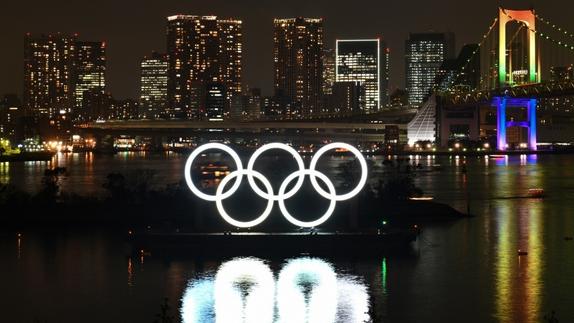 The Olympic rings off the shore of the Odaiba Marine Park are illuminated during the Tokyo 2020 Year Commemorative Ceremony in Tokyo on Jan 24, 2020, to mark six months before the opening of the Tokyo 2020 Olympic Games. (KAZUHIRO NOGI / AFP)
The Olympic rings off the shore of the Odaiba Marine Park are illuminated during the Tokyo 2020 Year Commemorative Ceremony in Tokyo on Jan 24, 2020, to mark six months before the opening of the Tokyo 2020 Olympic Games. (KAZUHIRO NOGI / AFP)
As the International Olympic Committee looks ahead to the Summer Games with trepidation, it does have something that could cushion the blow in case of cancellation: a US$897 million reserve fund to help finance global sports.
It’s an improbable scenario, but one drawing more consideration as the coronavirus continues to spread around the world. A number of global sporting events and Olympic qualifiers have been canceled, and many are now wondering how the outbreak might effect the 2020 Summer Games in Tokyo, scheduled to start at the end of July.
It’s a significant number, and would keep all the balls in the air if we actually missed a games
Dick Pound, IOC's longest-serving member
ALSO READ: Tokyo Olympic organizers rubbish Games cancellation rumor
The fund was established as a backstop for international sports federations that rely on the IOC to balance their budgets, said Dick Pound, the organization’s longest-serving member. That’s not soccer or basketball, but smaller sports like judo, volleyball and water polo.
Part of the IOC’s broader risk-management strategy, the fund was established in 2001 with US$105 million. It had grown to US$422 million by 2008.
“It’s a significant number, and would keep all the balls in the air if we actually missed a games,” Pound said in an interview.
Cases Surge
Coronavirus cases have surged to more than 80,000 worldwide, with new hot spots in Italy, South Korea and Iran. The World Health Organization has held off on declaring a global pandemic, but stock prices have plunged and bond yields have soared as investors worry about a further spread.
For now, the Olympic movement is moving forward with its plans for Tokyo. The US Olympic & Paralympic Committee has suggested a limit on all nonessential travel to Chinese mainland, Hong Kong and Singapore, but has informed its teams to continue training and preparing as planned.
On Tuesday, the committee sent an updated email to its teams advising them on the latest virus fallout, including event cancellations in both Italy and Iran and strict travel recommendations. “We don’t yet know the full impact of the new developments on Team USA athletes and staff,” the committee said in the memo.
Japanese politicians have also said there are no plans to move or cancel the games.
“The preparations for the Olympic Games Tokyo 2020 continue as planned,” the IOC said in a statement. “Countermeasures against infectious diseases constitute an important part of Tokyo 2020’s plans to host a safe and secure games.”
The committee said it has full confidence that the authorities, “in particular in Japan and China, will take all the necessary measures to address the situation.”
US$5.7 billion
The IOC made US$5.7 billion in its last four-year Olympic cycle, which included the 2016 Summer Games in Rio de Janeiro and the 2018 Winter Games in PyeongChang, South Korea. Of that total, 73 percent came from broadcast rights and 18 percent from top-level sponsors.
That money goes in part toward mounting the Olympic Games, and in part to national and international governing bodies to help fund athletes around the world. For the Summer Games in Rio, for example, the IOC distributed US$540 million to international federations and another US$540 million to national Olympic committees.
READ MORE: Tokyo Olympic Games will not be cancelled, say organizers
The reserve fund is just part of the IOC’s risk-management stores. The organization also has US$647 million in assets set aside from TV money, in case it needs to refund parts of those contracts; US$261 million to cover deficits in its main sponsorship program; and US$447 million to help cover distribution to national Olympic bodies.
Pound, who has been an IOC member since 1978 but isn’t involved in day-to-day management, said the organization isn’t in any immediate rush to make a decision on the games. He said late May, two months out from the opening ceremony, will likely be the point at which the entire Olympic movement needs to know if the games will be canceled or postponed.
“This is the most dangerous threat to the Olympics other than a state of actual war,” Pound said. “This is the new war scenario.”



